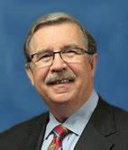WHITE SULPHUR SPRINGS, W.Va – Leaders across the state continue to take stock of healthcare’s future in West Virginia as they await changes to Medicaid following the passage of the One Great Big Beautiful Bill Act.

Dave Ramsey
That includes Vandalia Health president and CEO Dave Ramsey, who oversees not only one of the state’s largest healthcare providers but also one of its largest employers.
“I’m afraid we may be looking back and saying these past few years have been the golden age of healthcare in our country, and certainly in our state, because of Medicaid,” he said last week at the West Virginia Chamber of Commerce Business Summit.
Reports by the Kaiser Family Foundation indicate greater than 25% of West Virginians receive Medicaid benefits. Ramsey minced no words with regard to how he feels the new law will affect his field.
“We’re all excited about the Big Beautiful Bill except for those that are in healthcare that take care of a lot of Medicaid patients.”
Not all public figures within the state share Ramsey’s opinions on the issue, though. Senator Shelley Moore Capito has repeatedly spoken out in favor of the bill and voted for its passage earlier this year.

Shelley Moore Capito
“You’re going to hear, ‘Oh, we cut Medicaid.’ No, we didn’t. We just reined in the growth. It’s still going to grow by $200 billion over ten years. That’s significant. It was going to grow by $1 trillion,” she said Friday on MetroNews Talkline.
With Capito not characterizing the changes to the program as cuts, her focus remains on eliminating financial waste within Medicaid. She says her desire isn’t to take healthcare away from those who need it.
“There’s a work requirement. We’re also kicking people off that don’t deserve it. Some people are registered in four different states. We’re paying for that. That’s just a waste of money, and there’s a lot of waste built in there—billions of dollars,” she said.
Ramsey repeatedly stressed during his remarks at the summit that two of Vandalia Health’s primary goals are providing access to medical care for West Virginians and continuing to provide employment in the field of healthcare. He is concerned that cuts to Medicaid may hurt their efforts in doing both.
“If it’s not paid for, then we may not be able to have the access. We may not have the employees. We may not have the services. It could be very tragic,” he said.
According to Capito, there are already plans in place to make sure that doesn’t happen while also making sure that individuals who need benefits get them.
“We’re going to work with the states; it doesn’t kick in for another two years to try to figure out the best way to meet this challenge. I don’t want anybody to lose their healthcare, but I also want to preserve Medicaid for the people it’s really intended for,” she said.



